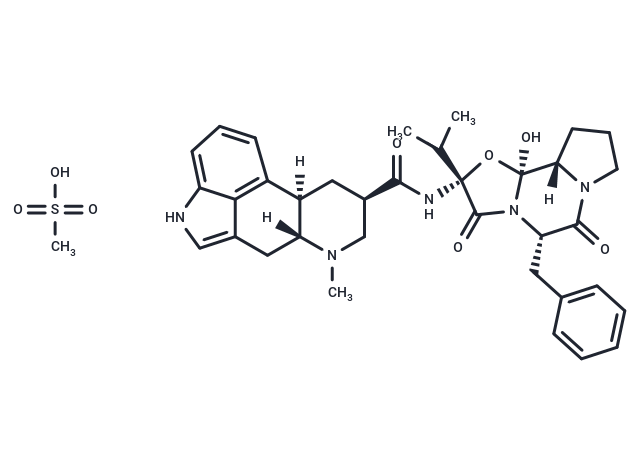 Your shopping cart is currently empty
Your shopping cart is currently empty

Dihydroergocristine mesylate (DHEC (mesylate))(DHEC mesylate) is the methanesulfonic acid salt of dihydroergocristine. It has been used as the for the symptomatic treatment of mental deterioration associated with cerebrovascular insufficiency and in peripheral vascular disease. Dihydroergocristine mesylate is a inhibitor of γ-secretase (GSI), , reduces the production of the Alzheimer's disease amyloid-β peptides, binds directly to γ-secretase and Nicastrin with equilibrium dissociation constants (Kd) of 25.7 nM and 9.8 μM, respectively[1]. It is also a component of ergoloid mesylate (codergocrine mesilate), a mixture of ergot alkaloid derivatives that is used as a vasodilator and has shown mild benefits in the treatment of vascular dementia. It has a role as a vasodilator agent, an alpha-adrenergic antagonist and a geroprotector. It contains a dihydroergocristine.

| Pack Size | Price | USA Warehouse | Global Warehouse | Quantity |
|---|---|---|---|---|
| 5 mg | $40 | In Stock | In Stock | |
| 10 mg | $64 | In Stock | In Stock | |
| 25 mg | $106 | In Stock | In Stock | |
| 50 mg | $155 | In Stock | In Stock | |
| 100 mg | $228 | In Stock | In Stock | |
| 1 mL x 10 mM (in DMSO) | $63 | In Stock | In Stock |
| Description | Dihydroergocristine mesylate (DHEC (mesylate))(DHEC mesylate) is the methanesulfonic acid salt of dihydroergocristine. It has been used as the for the symptomatic treatment of mental deterioration associated with cerebrovascular insufficiency and in peripheral vascular disease. Dihydroergocristine mesylate is a inhibitor of γ-secretase (GSI), , reduces the production of the Alzheimer's disease amyloid-β peptides, binds directly to γ-secretase and Nicastrin with equilibrium dissociation constants (Kd) of 25.7 nM and 9.8 μM, respectively[1]. It is also a component of ergoloid mesylate (codergocrine mesilate), a mixture of ergot alkaloid derivatives that is used as a vasodilator and has shown mild benefits in the treatment of vascular dementia. It has a role as a vasodilator agent, an alpha-adrenergic antagonist and a geroprotector. It contains a dihydroergocristine. |
| Targets&IC50 | GSI:25 μM |
| In vitro | The IC50 value(2-20 μM; 24 hours) of Dihydroergocristine (DHEC) for inhibiting the activity of γ-secretase in T100 cells without affecting cell viability is 25 μM. Dihydroergocristine (2-20 μM; 24 hours) inhibits cellular Aβ production and causes a dose-dependent accumulation of carboxy-terminal fragments of APP (APP-CTFs) in HEK293 and decreases γ-secretase activity in fibroblast cells[1]. |
| Cell Research | Dihydroergocristine (2-20 μM; 24 hours) causes a dose-dependent accumulation of carboxy-terminal fragments of APP (APP-CTFs) in HEK293 and decreases γ-secretase activity in fibroblast cells and inhibits cellular Aβ production[1]. |
| Synonyms | DHEC (mesylate) |
| Molecular Weight | 707.84 |
| Formula | C36H45N5O8S |
| Cas No. | 24730-10-7 |
| Smiles | CS(O)(=O)=O.[H][C@@]12CCCN1C(=O)[C@H](Cc1ccccc1)N1C(=O)[C@](NC(=O)[C@H]3CN(C)[C@]4([H])Cc5c[nH]c6cccc(c56)[C@@]4([H])C3)(O[C@@]21O)C(C)C |
| Relative Density. | 1.31g/cm3 |
| Color | White |
| Appearance | Solid |
| Storage | In solvent: -80°C for 1 year | Shipping with blue ice/Shipping at ambient temperature. | |||||||||||||||||||||||||||||||||||
| Solubility Information | DMSO: 60 mg/mL (84.76 mM), Sonication is recommended. H2O: 1 mg/mL (1.41 mM), Sonication is recommended. | |||||||||||||||||||||||||||||||||||
| In Vivo Formulation | 10% DMSO+40% PEG300+5% Tween 80+45% Saline: 2 mg/mL (2.83 mM), Sonication is recommended. Please add the solvents sequentially, clarifying the solution as much as possible before adding the next one. Dissolve by heating and/or sonication if necessary. Working solution is recommended to be prepared and used immediately. The formulation provided above is for reference purposes only. In vivo formulations may vary and should be modified based on specific experimental conditions. | |||||||||||||||||||||||||||||||||||
Solution Preparation Table | ||||||||||||||||||||||||||||||||||||
H2O/DMSO
DMSO
| ||||||||||||||||||||||||||||||||||||
| Size | Quantity | Unit Price | Amount | Operation |
|---|

Copyright © 2015-2026 TargetMol Chemicals Inc. All Rights Reserved.